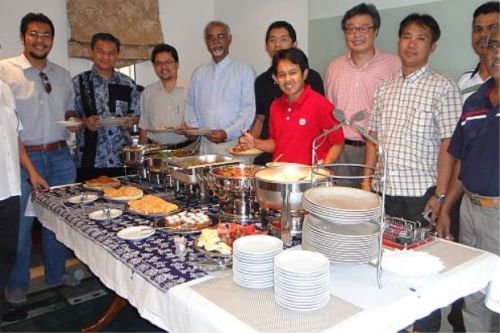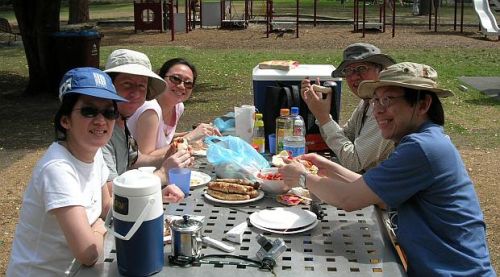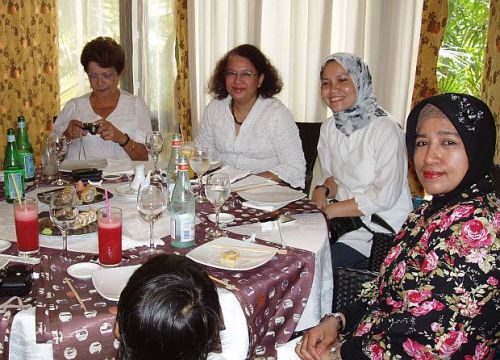Wednesday September 17, 2014
 Staff of Sime Darby Plantation (Liberia) Inc at a lunch hosted by the High Commissioner of Malaysia to Ghana, Cheong Loon Lai (fourth from right) at the Residence. They were recently evacuated from Liberia due to the Ebola outbreak and are operating from Accra for the time being.
Staff of Sime Darby Plantation (Liberia) Inc at a lunch hosted by the High Commissioner of Malaysia to Ghana, Cheong Loon Lai (fourth from right) at the Residence. They were recently evacuated from Liberia due to the Ebola outbreak and are operating from Accra for the time being.
PETALING JAYA: Whether they are away for years or months, Malaysians abroad agree that food brings them together, and being among Malaysians always feels like being at home.
“Malaysians love food and wherever they go, they will try to recreate Malaysian food, in all its diversity and flavours and share a meal. Get-togethers are very common and we introduce other Malaysians we happen to know, to each other. We talk about home and if you happen to meet someone from the same town/region there is even more to share,” says children's book author Tutu Dutta, who is in her 50s.
Even after being abroad for more than 25 years, accountant Indira Mahalingam-Ellis, in her 40s, says she still misses the food, and in particular the fruits.
“I especially miss durian, mangosteen, rambutan and mangoes.
“I also miss the jokes – the way we mix our languages in one sentence, and the diversity in cultures and food!” says Indira, who left Malaysia in 1987 to study in Britain and ended up settling down there.
Food unites
 Indira Mahalingam-Ellis (right) with her daughter Saffron.
Indira Mahalingam-Ellis (right) with her daughter Saffron.
Felicia Yeow, 47, says that when she lived in Brunei, the Malaysians would often take turns at hosting get-togethers.
“It also helped that there were a few Malaysian families living in the same apartment complex. In Australia, it's slightly harder to meet up because of the wider spread of area and there's lesser time in a big city compared to a smaller one,” she adds.
According to Yeow, typically when they have get-togethers, there is a lot of eating, laughing, reminiscing good times ... and more eating.
Lim Bee Ling, in her 40s, the wife of High Commissioner of Malaysia to Ghana, Cheong Loon Lai, says that when travelling abroad, one of the first things Malaysians typically ask is “are there any Malaysian restaurants around?”
Comfort
Apart from food, Lim believes the national language also binds us wherever we go.
“Back home we tend to speak our ethnic languages but when abroad, quite often Bahasa Malaysia becomes a common language, apart from English. We may be in remote corners of the world, but bumping into a fellow Malaysian, one can’t help but go 'Apa khabar? Kampung mana?' (How are you? Where is your hometown?),” she says.
Her husband’s work in the foreign service has brought them to Washington DC, Moscow, Hong Kong and now Accra, Ghana.
 Felicia Yeow (left) with family and friends enjoying an Aussie barbecue in Melbourne.
Felicia Yeow (left) with family and friends enjoying an Aussie barbecue in Melbourne.
“Due to the nature of his work, we come in close contact with Malaysians wherever we go. In fact, we try to reach out to fellow Malaysians. This is important, especially in times of crisis, when we need to disseminate information or evacuate people.
“For us in the foreign service, wherever we are posted, we know we always have an extended family in our embassy staff. Whether in a big or small mission, there will be colleagues we can count on.
“For many Malaysians who are working and living abroad, it’s comforting to know that there are fellow countrymen they can easily identify and connect with; that is why there are Malaysian associations – be it for social or business purposes – in many parts of the world. These are effective platforms that bring fellow countrymen together for common purposes,” explains Lim, singling out the Malaysia American Society (MAS) and the Malaysian Association of Hong Kong (MAHK).
Familiarity
Tutu also believes that the shared experiences of growing up, studying and living in Malaysia, binds us wherever they go.
“It is very comforting to spend time with other Malaysians overseas because there is no need to explain things to each other – everyone knows what and who you are talking about. A Malaysian among 'foreigners' is an unknown entity and you have to spend a lot of time explaining your country and (very complicated) multiracial and multicultural society to them. Being among Malaysians is a little like going home as you can let your guard down and be more of yourself,” says Tutu, who is the wife of a diplomat.
 Tutu Dutta (second from left) with diplomats' wives and friends at a lunch function.
Tutu Dutta (second from left) with diplomats' wives and friends at a lunch function.
Yeow agrees that there is a sense of comfort when spending time with fellow Malaysians.
Having lived in Australia and Brunei, Yeow has discovered that no matter where she is, she and other Malaysians tend to gravitate towards each other.
“The sense of shared history helps when meeting someone new, once you get past the 'which part of Malaysia are you from' bit, right down to the town/suburb/road, you're good to go anywhere and launch into any topic quickly.
“The ease of meeting fellow Malaysians is not limited to first generation Malaysians living abroad either. It extends to their children, who were born overseas but have Malaysian characteristics or are familiar with the culture,” says Yeow.
Nothing beats home
 Roshidah Abdul Karim with her family.
Roshidah Abdul Karim with her family.
Globalisation has made life abroad easier because these days you can probably find a Malaysian and a Malaysian restaurant in most countries. And, technology has added speed and convenience when it comes to keeping in touch with family and friends. Yet, nothing beats being home.
Chartered accountant Roshidah Abdul Karim, in her 40s, says she misses the atmosphere.
“I miss being able to get Malaysian food 24/7, the noise, the choices and the smells. I also miss the smiles, the language, the culture but not the negative mindset, which by the way can be found in all countries.
“Malaysia is always in my heart. My love for the country will never change. I am immensely proud to be a Malaysian,” says the mother of two who left in 1984 to study in New Zealand and then stayed on there.
“Malaysia will always be my home. When I left the country, I brought along a Malaysia flag with me, much to the amusement of some people I know. Of course, I still love Malaysia. That it is a country with great promise and a wonderful blend of cultures,” admits technical writer Kelly Goh, 38, who now lives in Australia.
Indira, who returns almost every year with her daughter, explains it succinctly:
“You are never a foreigner at home. I've lived in Britain for 26 years now and I'm constantly reminded that I am an immigrant especially with elections coming up.”
According to Lim, no matter how good (or bad) a posting or trip abroad is, the one thing she looks forward to is hearing the pilot say, “Selamat pulang ke tanahair” (Welcome home).
“Malaysia is and will always be home,” she says.